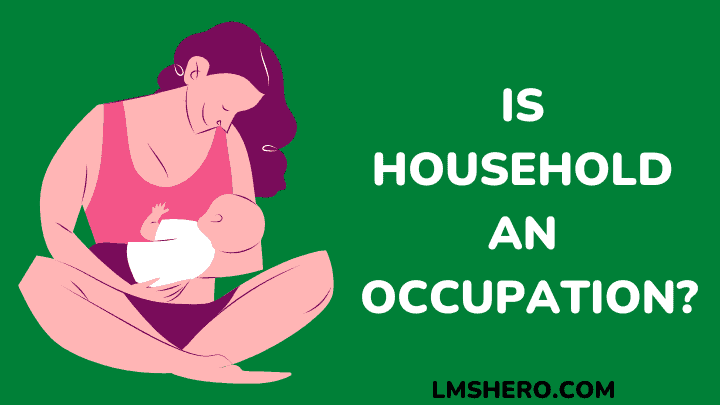The debate over whether being a housewife is considered an occupation has been ongoing for years. Since domestic work is increasingly recognized as valuable, many believe housewives should be compensated for their efforts in raising a family and managing the household.
These tasks require various skills, including organization, time management, and problem-solving, and can be physically, emotionally, and mentally demanding. Meanwhile, traditional gender roles often view the role of the housewife as one performed within the confines of the home and unremunerated.
The lack of clear distinction between the role of a housewife and other forms of caregiving further complicates the question. The answer ultimately depends on individual perspectives and societal attitudes toward the role of women in the household and the workplace.
So, is housewife an occupation? Read on to find out.
First, what is an occupation?
Before delving into the discussion, it is important to define what is meant by “occupation.” An occupation can be defined as a paid job that requires specialized training or education and provides a salary, benefits, and job security.
However, this definition is not absolute (it can vary from person to person), and the idea of occupation can also change over time, as societal norms and values evolve.
Society must re-evaluate its values and attitudes toward a housewife’s crucial and often underappreciated role. Get the latest insights on the ongoing debate over the occupation status of housewives below.
Why being a housewife is an occupation
1. The nature of the work
Being a housewife involves many tasks, including meal preparation, cleaning, laundry, shopping, and childcare. It is a 24/7 job that requires a high level of organization, planning, and time management skills.
The work is physically demanding and requires a lot of energy, as housewives have to perform multiple tasks simultaneously. Hence, there is a need for remuneration.
2. Importance of domestic skills
Domestic skills are essential for maintaining a clean, safe, and comfortable household. Housewives are responsible for ensuring that their families are fed nutritious meals and have clean clothes to wear.
They also play a crucial role in the education and upbringing of their children. Domestic skills such as cooking, cleaning, and sewing are acquired through years of practice and are integral to being a housewife.
3. Emotional labor
In addition to the physical tasks, housewives must also perform emotional labor. This includes managing family relationships, supporting their spouse, and ensuring that the household runs smoothly.
Housewives often have to put their own needs aside to cater to their family’s needs, which can be emotionally draining. Emotional labor is crucial to being a housewife and requires high resilience and emotional intelligence.
4. Economic contribution
Being a housewife also has significant economic value. Their work saves families money that would otherwise be spent on hiring a cleaner, chef, or nanny.
Moreover, housewives often play a crucial role in managing the household budget, which helps families save money. The economic contribution of housewives is often overlooked, and their work should be valued and recognized.
5. Challenges faced by housewives
Despite the significance of their work, housewives often face numerous challenges. The lack of recognition of their work as an occupation can lead to feelings of isolation and low self-esteem. Housewives also lack financial independence, as they are not paid for their work.
This can make them reliant on their spouse and limit their ability to make financial decisions. Moreover, housewives are often overburdened with multiple tasks, leading to stress and burnout.

Why being a housewife is not an occupation
1. Lack of remuneration
One of the most significant reasons why being a housewife is not considered an occupation is the absence of monetary compensation. A housewife does not receive a salary or any other form of payment for her work, which is one of the primary characteristics of a job or occupation.
2. No official job title
A housewife does not have an official job title, and most countries do not recognize her role as a profession. This means that there is no official recognition of the responsibilities and duties of a housewife, and it is not considered a legitimate career choice.
3. Absence of job security
Housewives do not receive a salary, benefits, or any form of compensation for their labor; their income is unreliable, and there is no guarantee of continuous employment. They often depend on the income and stability of their spouses or other family members for financial security.
Without a steady income, they may find themselves without a constant source of income if their spouse loses their job or the family’s economic situation changes. This can make it difficult to plan for the future and provide for the household.
Additionally, since there is no employer-employee relationship, housewives have no legal protections or commitment in terms of salary.
4. Lack of professional development opportunities and recognition
Another reason being a housewife has yet to be considered an occupation is that it doesn’t require specific training or qualifications.
Housewives are not seen as having a professional occupation because they do not have access to the same opportunities for career advancement that other professions offer.
Without these opportunities, housewives cannot acquire new skills or gain experience, making them less desirable candidates for certain jobs.
Furthermore, housewives’ contributions are not recognized similarly to paid workers because they concentrate on domestic duties and emotional support for their families.
This can be particularly discouraging for those who aspire to pursue meaningful careers but cannot do so due to the lack of professional development opportunities.
FAQs
Should spouses agree on whether the wife gets paid for her duties?
Yes. Spouses must communicate and agree about whether the wife should be paid for her duties. If the couple agrees it is appropriate, they should create a fair and transparent compensation system.
Is being a full-time housewife a bad thing?
No, being a full-time housewife is not necessarily a bad thing. It is a choice that some women make and depending on the individual’s circumstances, it can be a gratifying and fulfilling experience.
However, anyone in this role needs to ensure that their needs are met emotionally and financially. It is also important to stay active and engaged in the world around them to avoid feeling isolated or disconnected.
Conclusion
Whether being a housewife is considered an occupation is a complex and controversial issue that elicits varying opinions and perspectives.
On the one hand, being a housewife involves many physically, emotionally, and mentally demanding tasks that require organization, time management, and problem-solving skills. On the other hand, being a housewife is not remunerated, lacks job security, and offers no opportunities for professional development.
The responsibilities that come with being a housewife are often underestimated. Still, the reality is that these individuals do a tremendous amount of work, from taking care of the household to providing emotional and psychological support for their family members.
Whether a housewife is an occupation depends on individuals and their views. Whatever the opinion, housewives play a vital role in the family and society, despite not being traditionally recognized as an occupation.
Ultimately, housewives should be celebrated for their hard work and dedication to providing a better life for their families.
For housewives looking to transition into the workforce, here is how to ask if a place is hiring and format your resume. You may also want to read the article can stay-at-home moms collect unemployment benefits if you are unsure of your career path or want to explore home-based income options.
Thank you for reading.







